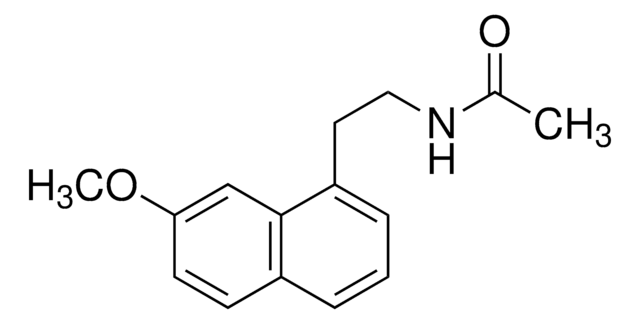SML0278
SR 48692
≥98% (HPLC)
Synonym(s):
2-[[[1-(7-Chloro-4-quinolinyl)-5-(2,6-dimethoxyphenyl)-1H-pyrazol-3-yl]carbonyl]amino]-tricyclo[3.3.1.13,7]decane-2-carboxylic acid, Meclinertant
About This Item
Recommended Products
Quality Level
Assay
≥98% (HPLC)
form
powder
color
white to beige
solubility
DMSO: ≥2 mg/mL (warmed)
storage temp.
−20°C
SMILES string
COc1cccc(OC)c1-c2cc(nn2-c3ccnc4cc(Cl)ccc34)C(=O)NC5(C6CC7CC(C6)CC5C7)C(O)=O
InChI
1S/C32H31ClN4O5/c1-41-27-4-3-5-28(42-2)29(27)26-16-24(36-37(26)25-8-9-34-23-15-21(33)6-7-22(23)25)30(38)35-32(31(39)40)19-11-17-10-18(13-19)14-20(32)12-17/h3-9,15-20H,10-14H2,1-2H3,(H,35,38)(H,39,40)
InChI key
DYLJVOXRWLXDIG-UHFFFAOYSA-N
Gene Information
human ... NTSR1(4923)
Application
- to explore the function of NTSR1 in glioblastoma (GBM) cells
- to determine the roles of neurotensin (NT) in the regulation of bile acid (BA) uptake, in vivo
- to explore the involvement of NTSR1 versus NTSR2 in mice
Biochem/physiol Actions
Features and Benefits
Storage Class Code
11 - Combustible Solids
WGK
WGK 3
Flash Point(F)
Not applicable
Flash Point(C)
Not applicable
Choose from one of the most recent versions:
Certificates of Analysis (COA)
Don't see the Right Version?
If you require a particular version, you can look up a specific certificate by the Lot or Batch number.
Already Own This Product?
Find documentation for the products that you have recently purchased in the Document Library.
Our team of scientists has experience in all areas of research including Life Science, Material Science, Chemical Synthesis, Chromatography, Analytical and many others.
Contact Technical Service








